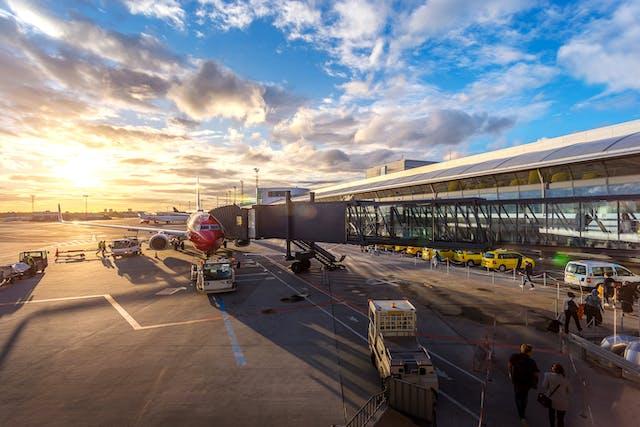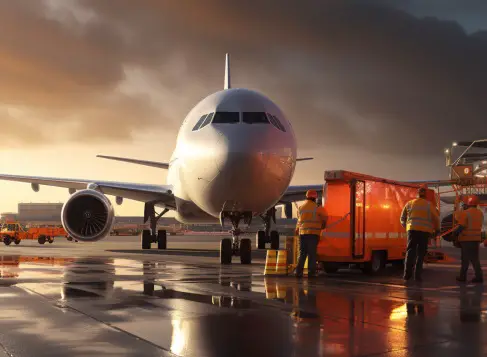Business
5 Interesting Facts About Ground Support at Airports

Air travel is a complex and highly coordinated operation, with many behind-the-scenes activities that ensure passengers’ safe and efficient experience. Ground support services at airports play a crucial role in this process, encompassing a wide range of tasks and operations. This guide will delve into five interesting facts about ground support at airports. From the incredible machinery and equipment used to the intricate coordination between various teams, these facts shed light on the fascinating world of airport ground support.
Table of Contents
Ground Support Gear Is Diverse and Highly Specialized
The ground support gear used at airports is incredibly diverse and highly specialized to meet the unique needs of each aircraft type. From tugs and baggage carts to de-icing trucks and mobile air conditioning units, these machines ensure that every aspect of aircraft handling is efficient and safe. One interesting piece of ground support equipment is the aircraft pushback tractor. These vehicles, often operated by specially trained personnel, are used to maneuver aircraft away from the gate before taxiing to the runway.
Pushback tractors are designed to accommodate various aircraft sizes and are equipped with powerful engines to handle the immense weight of large commercial planes. Other specialized equipment includes refuelers, catering trucks, and ground power units. The vast array of machinery used in ground support showcases the level of precision and engineering that goes into supporting air travel.
Baggage Handling Systems Are Complex and Efficient
The efficient handling of passengers’ baggage is a critical part of airport ground support. It’s fascinating to note that airports utilize intricate baggage handling systems to manage the flow of checked luggage. Automated conveyor belts, high-speed sorting systems, and baggage scanning equipment work in unison to transport bags from the check-in counter to the appropriate aircraft.
These systems are designed to minimize the risk of baggage mishandling and ensure that your luggage reaches its destination without issue. Intriguingly, some large airports have entire underground networks for baggage handling, featuring miles of conveyor belts and complex sorting systems. These systems can process thousands of bags per hour, showcasing the technology and automation involved in ensuring your luggage arrives safely at your destination.
Airports Are Home to Impressive Firefighting Equipment

Safety is a paramount concern at airports, and they are equipped with impressive firefighting equipment to handle emergencies. One particularly interesting piece of equipment is the aircraft rescue and firefighting (ARFF) vehicle. ARFF vehicles are specialized fire trucks designed to respond to aircraft emergencies, such as fires, fuel spills, or evacuations.
These vehicles are equipped with large water cannons, foam systems, and other firefighting tools to swiftly and effectively respond to aviation incidents. One remarkable fact is that ARFF vehicles are built to comply with strict regulations and guidelines set by aviation authorities. They must reach the scene of an aircraft incident within a specific time frame and can carry a substantial amount of firefighting agents to extinguish flames and save lives.
Ground Support Operations Are Tightly Coordinated
The efficient functioning of ground support at airports requires meticulous coordination between various teams and entities. Ground operations staff, air traffic controllers, airline personnel, and ground support crews work in tandem to ensure that every aspect of aircraft handling, from boarding passengers to refueling, is seamless. Ground support operations are typically conducted with precise timing. Aircraft are guided to the gate, passengers disembark, and ground support crews immediately begin their tasks.
Baggage is loaded and unloaded, the aircraft is refueled, catering services are provided, and maintenance tasks are performed, all within tight timeframes. The coordination between ground support and air traffic control is particularly fascinating. Air traffic controllers provide clear instructions to pilots and ground support teams, ensuring that aircraft movements on the tarmac are orderly and safe.
Ground Support Teams Often Work in Challenging Conditions
Ground support personnel frequently work in challenging conditions to keep air travel running smoothly. They are exposed to a wide range of weather conditions, including extreme heat, cold, rain, and snow. Handling aircraft in adverse weather can be demanding and requires special training to maintain safety and efficiency. Ground support teams must also be prepared to handle unexpected emergencies, such as engine fires, medical emergencies, or security threats.
They are trained to react swiftly and effectively to ensure the safety of passengers and crew. Moreover, the nature of the work often means long hours and irregular shifts. Ground support personnel must adapt to variable schedules, including early mornings, late nights, and holidays, to meet the demands of the airline industry.
Conclusion
Ground support at airports is a complex and fascinating world where highly specialized equipment and skilled personnel ensure the safe and efficient movement of aircraft. From diverse ground support equipment to intricate baggage handling systems and impressive firefighting equipment, the behind-the-scenes operations at airports are essential to the smooth functioning of air travel. The tightly coordinated efforts of various teams and the dedication of ground support personnel, who often work in challenging conditions, make air travel a reliable and safe mode of transportation. Understanding these interesting facts about ground support sheds light on the intricate and dynamic world of aviation.
Also Read:- 5 Interesting Facts About Christmas Trees

-

 Business3 years ago
Business3 years agoHow to Do Long-Distance Moves with Children
-

 Travel2 years ago
Travel2 years agoQuick Guide: Moving To Santa Rosa?
-

 Real Estate3 years ago
Real Estate3 years agoWhy Dubai Festival City is a Great Neighbourhood for Young Learners
-

 Business3 years ago
Business3 years agoIs Guest Posting a Good Inbound Marketing Strategy?
-

 Business1 year ago
Business1 year agoThe Ultimate Guide To Thriving In Your Printing Franchise
-

 Business1 year ago
Business1 year agoExploring The Benefits And Challenges Of Restaurant Franchising
-

 Tech3 years ago
Tech3 years agoCyber Table That Will Change Your Life
-

 Lifestyle1 year ago
Lifestyle1 year agoDallas’ Hidden Gems: 6 Must-Try Restaurants Off The Beaten Path!





















Recent Comments